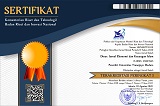Zakat Literacy: Digital Islamic Finance in Community Economic Development
Abstract
The purpose of this study is to explore the pivotal roles of Islamic finance and Zakat, particularly in the context of digital transformation, in improving financial literacy and fostering economic growth within communities. The study specifically examines how the digitalization of Zakat collection and distribution, alongside other Islamic finance principles, contributes to the development of an inclusive and ethical economy rooted in Islamic values.
This study employs a mixed-method approach, combining qualitative and quantitative analyses. Data is gathered through interviews, case studies, and statistical analysis to explore the impact of digital Islamic finance and Zakat management on community economic development. The study focuses on how digital literacy in Islamic finance, particularly Zakat, can enhance economic outcomes and the effectiveness of these tools for poverty alleviation.
The study reveals that integrating Islamic finance and Zakat with digital technology significantly improves financial literacy, leading to better economic decision-making and sustainable economic development. The digitalization of Zakat processes not only increases transparency and efficiency but also broadens the reach and impact of Zakat, reinforcing its role as a crucial instrument in Islamic finance for poverty alleviation. However, key challenges, such as gaps in public understanding and limited access to financial education, need to be addressed to fully leverage the potential of digital Islamic finance and Zakat.
Keywords
Full Text:
PDFReferences
Al-Arif, M. N. R., & Rianto, N. (2010). Efek pengganda zakat serta implikasinya terhadap program pengentasan kemiskinan. Jurnal Ekbisi Fakultas Syariah UIN Sunan Kalijaga Yogyakarta, 5(1), 42–49.
Bank Indonesia. (2014). Digital Financial Inclusion In Indonesia Financial Inclusion And Electronification Task Force Bank Indonesia Transformation. DIGITAL FINANCIAL INCLUSION IN INDONESIA Financial.
Bappenas. (2018). Preliminary Meeting of PKH Pilot Project. BAPPENAS.
BAZNAS. (2021). Zakat.
BI. (2014). Elektronifikasi. Bank Indonesia.
Canggih, C., Fikriyah, K., & Yasin, A. (2017). POTENSI DAN REALISASI DANA ZAKAT INDONESIA. Al-Uqud : Journal of Islamic Economics. https://doi.org/10.26740/jie.v1n1.p14-26
Daud. (2012). Kementerian agama balai diklat keagamaan palembang januari 2012 1. 1–8. https://bdkpalembang.kemenag.go.id/
Denkenberger, D., Way, J., & Pearce, J. M. (2015). Educational pathways to remote employment in isolated communities. Journal of Human Security, 11(1), 34–44. https://doi.org/10.12924/johs2015.11010034
Haryanto, R., Bakri, A. A., Samosir, H. E. S., Idris, D. L., Fauzan, T. R., & Agustina, W. (2023). Digital Literacy and Determinants of Online Zakat Payments Lessons From Indonesia Experience With Utaut. Journal of Law and Sustainable Development, 11(4), 1–18. https://doi.org/10.55908/sdgs.v11i4.575
Lopus, J. S., Amidjono, D. S., & Grimes, P. W. (2019). Improving financial literacy of the poor and vulnerable in Indonesia: An empirical analysis. International Review of Economics Education, 32(May), 100168. https://doi.org/10.1016/j.iree.2019.100168
Lusardi, A., & Mitchell, O. S. (2014). The economic importance of financial literacy: Theory and evidence. Journal of Economic Literature, 52(1), 5–44. https://doi.org/10.1257/jel.52.1.5
Maisyal, N. (2021). Contemporary Zakat Literacy As A Zakat Therapy Method. JOUSIP: Journal of Sufism and Psychotherapy, 1(2), 113–126. https://doi.org/10.28918/jousip.v1i2.4352
Malik, A., Alrasyid, H., & Kamaruddin, M. M. (2024). Student compliance in paying zakat: Do zakat literacy and awareness matter? Asian Journal of Islamic Management (AJIM), 6(1), 63–73. https://doi.org/10.20885/ajim.vol6.iss1.art6
Nezhad Haj Ali Irani, F., Reza Noruzi, M., Papavasileiou, E. F., Lyons, S. T., Ferrell, O. C., Harrison, D. E., Ferrell, L., Hair, J. F., Carter, S. P., Dudley, W., Lyle, D. S., Smith, J. Z., Batarliene, N., Čižiuniene, K., Vaičiute, K., Šapalaite, I., Jarašuniene, A., Daswati, Yudiaatmaja, F., … Hirekhan, M. (2017). Issn 1412 – 8683 29. Procedia - Social and Behavioral Sciences, IV(2), 29–38. https://doi.org/10.6007/ijarbss/v3-i10/295
Pamuji, P. (2023). Akselerasi Literasi Zakat Produktif sebagai Upaya Pembangunan Ekonomi Masyarakat Kecamatan Muara Telang Kabupaten Banyuasin. Journal of Business and Economics Research (JBE), 4(1), 115–123. https://doi.org/10.47065/jbe.v4i1.3153
Pertiwi, I. S. M. (2020). Pengaruh tingkat pendapatan, literasi zakat dan kepercayaan terhadap minat masyarakat dalam membayar zakat pada baznas provinsi lampung. 8(1), 1–9.
PUSKAS. (2019). Indeks dan Literasi Zakat.
Rizal, S., & Pakkanna, M. (2023). Digitalization of Zakat in Stimulating Community Socio-Economic Development in the Middle of the Covid-19 Pandemic (Maqashid Syariah Perspective). European Journal of Humanities and Social Sciences, 3(1), 23–33. https://doi.org/10.24018/ejsocial.2023.3.1.384
Samsul Rizal, I. A. (2022). POTENSI DAN EFEKTIVITAS PENGELOLAAN ZAKAT. Jurnal Ekonomi Dan Bisnis, 9(1), 275–281.
Weare.social. (2022). People and Culture.
DOI: https://doi.org/10.21107/dinar.v11i1.27549
Refbacks
- There are currently no refbacks.
Copyright (c) 2024 Damirah Damirah, Sahrani Sahrani, Musmulyadi Musmulyadi

This work is licensed under a Creative Commons Attribution-ShareAlike 4.0 International License.
Journal Dinar Indexed by:
Dinar: Jurnal Ekonomi dan Keuangan Islam by Universitas Trunojoyo Madura is licensed under a Creative Commons Attribution-ShareAlike 4.0 International License.






.png)










